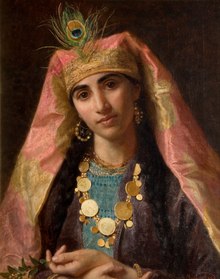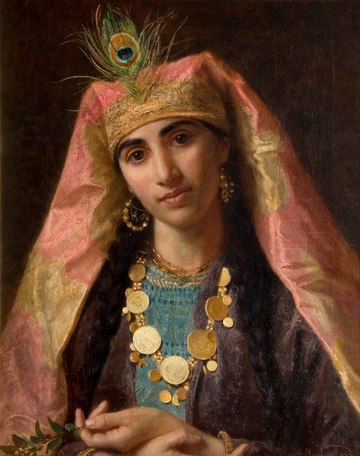Scheherazade (/ʃəˌhɛrəˈzɑːd, -də/)[1] is a major character and the storyteller in the frame narrative of the Middle Eastern collection of tales known as the One Thousand and One Nights.
| Scheherazadeشهرزاد | |
|---|---|
| One Thousand and One Nights character | |
 Scheherazade, 19th century painting by Sophie Anderson | |
| Portrayed by | Mili Avital, Catherine Zeta-Jones, Claude Jade, Anna Karina, María Montez, Cyrine Abdelnour, Sulaf Fawakherji, Annette Haven, Meredith Stepien, Damini Kanwal Shetty |
| In-universe information | |
| Gender | Female |
| Occupation | Queen consort |
| Family |
|
| Spouse | Shahryar |
| Children | 3 sons and possibly 1 daughter |
| Other names | Shahrazad, Shahrzad |
Name
According to modern scholarship, the name Scheherazade derives from the Middle Persian name Čehrāzād, which is composed of the words čehr ('lineage') and āzād ('noble, exalted').[2][3][4] The earliest forms of Scheherazade's name in Arabic sources include Shirazad (Arabic: شيرازاد, romanized: Šīrāzād) in al-Masudi, and Shahrazad in Ibn al-Nadim.[5][6]
The name appears as Šahrazād in the Encyclopaedia of Islam[4] and as Šahrāzād in the Encyclopædia Iranica.[3] Among standard 19th-century printed editions, the name appears as شهرزاد, Šahrazād in Macnaghten's Calcutta edition (1839–1842)[7] and in the 1862 Bulaq edition,[8] and as شاهرزاد, Šāhrazād in the Breslau edition (1825–1843).[9] Muhsin Mahdi's critical edition has شهرازاد, Šahrāzād.[10]
The spelling Scheherazade first appeared in English-language texts in 1801, borrowed from German usage.[1]

Narration

The story goes that the monarch Shahryar, on discovering that his first wife was unfaithful to him, resolved to marry a new virgin every day and to have her beheaded the next morning before she could dishonor him. Eventually, the vizier could find no more virgins of noble blood and, against her father's wishes, Scheherazade volunteered to marry the king.
Sir Richard Burton's translation of The Nights describes Scheherazade in this way:
Scheherazade had perused the books, annals, and legends of preceding Kings, and the stories, examples, and instances of bygone men and things; indeed it was said that she had collected a thousand books of histories relating to antique races and departed rulers. She had perused the works of the poets and knew them by heart; she had studied philosophy and the sciences, arts, and accomplishments; and she was pleasant and polite, wise and witty, well-read and well-bred.
Once in the king's chambers, Scheherazade asked if she might bid one last farewell to her beloved younger sister, Dunyazad, who had secretly been prepared to ask Scheherazade to tell a story during the long night. The king lay awake and listened with awe as Scheherazade told her first story. The night passed by, and Scheherazade stopped in the middle. The king asked her to finish, but Scheherazade said there was no time, as dawn was breaking. So the king spared her life for one day so she could finish the story the next night. The following night Scheherazade finished the story and then began a second, more exciting tale, which she again stopped halfway through at dawn. Again, the king spared her life for one more day so that she could finish the second story.
Thus the king kept Scheherazade alive day by day, as he eagerly anticipated the conclusion of each previous night's story. At the end of 1,001 nights, and 1,000 stories, Scheherazade finally told the king that she had no more tales to tell him. She summoned her three sons that she had bore him during the 1000 nights to come in before the king (one was a nursling, one was crawling, and one could walk) and she placed them in front of the king. Then she kissed the ground again and said: "King of the age, these are your children and my wish is that as an act of generosity towards them to free me from sentence of death, for if you kill me, these babies will have no mother and you will find no other woman to bring them up so well." The king granted her a pardon as he could see that she was a "chaste and pure woman, freeborn and God-fearing." He then presented a splendid and magnificent robe to Scheherazade's father, the vizier. and she was celebrated throughout his kingdom for 30 days.
See also
References
External links
Wikiwand in your browser!
Seamless Wikipedia browsing. On steroids.
Every time you click a link to Wikipedia, Wiktionary or Wikiquote in your browser's search results, it will show the modern Wikiwand interface.
Wikiwand extension is a five stars, simple, with minimum permission required to keep your browsing private, safe and transparent.
